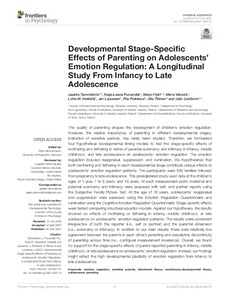Developmental Stage-Specific Effects of Parenting on Adolescents' Emotion Regulation: A Longitudinal Study From Infancy to Late Adolescence
Tammilehto Jaakko; Punamäki Raija-Leena; Flykt Marjo; Vänskä Mervi; Heikkilä Lotta M.; Lipsanen Jari; Poikkeus Piia; Tiitinen Aila; Lindblom Jallu
https://urn.fi/URN:NBN:fi-fe2021093047968
Tiivistelmä
The quality of parenting shapes the development of children's emotion regulation. However, the relative importance of parenting in different developmental stages, indicative of sensitive periods, has rarely been studied. Therefore, we formulated four hypothetical developmental timing models to test the stage-specific effects of mothering and fathering in terms of parental autonomy and intimacy in infancy, middle childhood, and late adolescence on adolescents' emotion regulation. The emotion regulation included reappraisal, suppression, and rumination. We hypothesized that both mothering and fathering in each developmental stage contribute unique effects to adolescents' emotion regulation patterns. The participants were 885 families followed from pregnancy to late adolescence. This preregistered study used data at the children's ages of 1 year, 7 to 8 years, and 18 years. At each measurement point, maternal and paternal autonomy and intimacy were assessed with self- and partner reports using the Subjective Family Picture Test. At the age of 18 years, adolescents' reappraisal and suppression were assessed using the Emotion Regulation Questionnaire and rumination using the Cognitive Emotion Regulation Questionnaire. Stage-specific effects were tested comparing structural equation models. Against our hypotheses, the results showed no effects of mothering or fathering in infancy, middle childhood, or late adolescence on adolescents' emotion regulation patterns. The results were consistent irrespective of both the reporter (i.e., self or partner) and the parental dimension (i.e., autonomy or intimacy). In addition to our main results, there were relatively low agreement between the parents in each other's parenting and descriptive discontinuity of parenting across time (i.e., configural measurement invariance). Overall, we found no support for the stage-specific effects of parent-reported parenting in infancy, middle childhood, or late adolescence on adolescents' emotion regulation. Instead, our findings might reflect the high developmental plasticity of emotion regulation from infancy to late adolescence.
Kokoelmat
- Rinnakkaistallenteet [29337]
